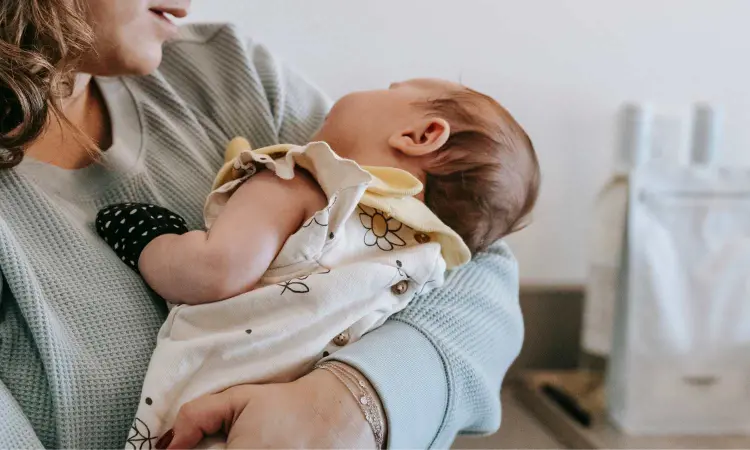- Home
- Medical news & Guidelines
- Anesthesiology
- Cardiology and CTVS
- Critical Care
- Dentistry
- Dermatology
- Diabetes and Endocrinology
- ENT
- Gastroenterology
- Medicine
- Nephrology
- Neurology
- Obstretics-Gynaecology
- Oncology
- Ophthalmology
- Orthopaedics
- Pediatrics-Neonatology
- Psychiatry
- Pulmonology
- Radiology
- Surgery
- Urology
- Laboratory Medicine
- Diet
- Nursing
- Paramedical
- Physiotherapy
- Health news
- Fact Check
- Bone Health Fact Check
- Brain Health Fact Check
- Cancer Related Fact Check
- Child Care Fact Check
- Dental and oral health fact check
- Diabetes and metabolic health fact check
- Diet and Nutrition Fact Check
- Eye and ENT Care Fact Check
- Fitness fact check
- Gut health fact check
- Heart health fact check
- Kidney health fact check
- Medical education fact check
- Men's health fact check
- Respiratory fact check
- Skin and hair care fact check
- Vaccine and Immunization fact check
- Women's health fact check
- AYUSH
- State News
- Andaman and Nicobar Islands
- Andhra Pradesh
- Arunachal Pradesh
- Assam
- Bihar
- Chandigarh
- Chattisgarh
- Dadra and Nagar Haveli
- Daman and Diu
- Delhi
- Goa
- Gujarat
- Haryana
- Himachal Pradesh
- Jammu & Kashmir
- Jharkhand
- Karnataka
- Kerala
- Ladakh
- Lakshadweep
- Madhya Pradesh
- Maharashtra
- Manipur
- Meghalaya
- Mizoram
- Nagaland
- Odisha
- Puducherry
- Punjab
- Rajasthan
- Sikkim
- Tamil Nadu
- Telangana
- Tripura
- Uttar Pradesh
- Uttrakhand
- West Bengal
- Medical Education
- Industry
Lung Ultrasonography Scores Predict Respiratory Outcomes in Preterm Infants, JAMA unravels research

Researchers have found that lung ultrasonography score (LUS) can predict respiratory outcomes in preterm infants, providing a valuable tool for early intervention. A recent study was published in the JAMA Network Open by Luca Bonadies and colleagues. The trial demonstrated that a higher LUS within the first two weeks of life is associated with an increased risk of respiratory complications.
Preterm birth and bronchopulmonary dysplasia (BPD) frequently lead to poor respiratory outcomes and frequent exacerbations. Growing evidence supports using LUS to estimate BPD risk, but its association with later respiratory outcomes was unknown until this study. The Province of Padua Ethics Committee for Clinical Trials approved the study, and parents provided written informed consent.
The objective was to evaluate the association between LUS within the first 3, 7, and 14 days of life (DOL) and respiratory outcomes, such as exacerbations, wheezing episodes, and medication use, at 2 years' corrected age. This multicenter, prospective study enrolled 51 preterm infants (<30 weeks' gestation) between September 2019 and November 2022. Clinical data and validated respiratory morbidity scores were collected. LUS was evaluated as a risk factor for respiratory outcomes using area under the receiver operating characteristic curve (AUC) analysis. Statistical analysis was performed with IBM SPSS Statistics 28.0.1, with two-sided P < .05 indicating statistical significance.
• The mean gestational age was 27.3 ± 1.7 weeks; 39.2% were female, 60.8% male. The mean birth weight was 947 ± 301 grams.
• 16 infants (31%) developed moderate to severe BPD, and 8 (16%) developed mild BPD.
• Post-discharge, 32 infants (63%) received at least one respiratory drug, 16 (31%) were hospitalized for respiratory problems, and 3 (6%) needed pediatric ICU admission.
• The mean respiratory morbidity score at 2 years was 0.51 ± 0.76.
• Infants needing respiratory drugs had higher median LUS at DOL 3 (1 [0-3] vs 6 [3-10]; P = .02), DOL 7 (0 [0-1] vs 5 [2-10]; P < .001), and DOL 14 (1 [0-2] vs 6 [1-11]; P < .001). Higher LUS at DOL 3 (3 [0-7] vs 4 [3-12]; P < .001), DOL 7 (1 [0-4] vs 10 [5-12]; P < .001), and DOL 14 (2 [0-3] vs 8 [7-12]; P < .001) was also observed in infants needing hospitalization. Infants needing ICU had LUS over 8 consistently.
• At DOL 7, LUS correlated with the number of respiratory exacerbations needing drugs (ρ = 0.762) or hospitalization (ρ = 0.663) and with the respiratory morbidity score (ρ = 0.714).
• Adjusted analyses for gestational age showed significant results for DOL 7 and 14 (e.g., needing drugs: adjusted β = 0.352 and 0.177).
• AUC analysis showed significant associations at DOL 7 (0.838 for needing drugs and 0.868 for needing hospitalizations).
The study highlights the importance of respiratory outcomes in the first 2 years of life for preterm infants with BPD. A higher LUS within the first 14 days is a risk factor for more frequent respiratory episodes. LUS at DOL 7 and 14, especially, showed strong correlations with the need for respiratory medications and hospitalizations, suggesting that this time frame is critical for predicting long-term outcomes.
The study demonstrates that LUS within the first 14 days of life is a predictive tool for respiratory outcomes in preterm infants. The study's findings support the use of LUS to guide early interventions, potentially improving long-term respiratory health in this vulnerable population.
Reference:
Bonadies, L., De Luca, D., Auciello, M., Moschino, L., Congedi, S., Nardo, D., & Baraldi, E. (2024). Lung ultrasonography scores in preterm infants and respiratory outcomes at age 2 years. JAMA Network Open, 7(6), e2415513. https://doi.org/10.1001/jamanetworkopen.2024.15513
Dr Riya Dave has completed dentistry from Gujarat University in 2022. She is a dentist and accomplished medical and scientific writer known for her commitment to bridging the gap between clinical expertise and accessible healthcare information. She has been actively involved in writing blogs related to health and wellness.
Dr Kamal Kant Kohli-MBBS, DTCD- a chest specialist with more than 30 years of practice and a flair for writing clinical articles, Dr Kamal Kant Kohli joined Medical Dialogues as a Chief Editor of Medical News. Besides writing articles, as an editor, he proofreads and verifies all the medical content published on Medical Dialogues including those coming from journals, studies,medical conferences,guidelines etc. Email: drkohli@medicaldialogues.in. Contact no. 011-43720751


